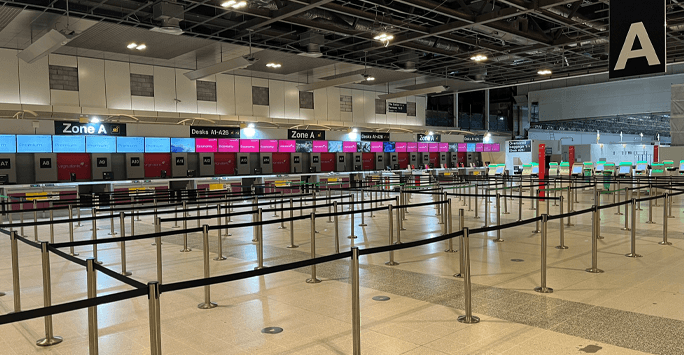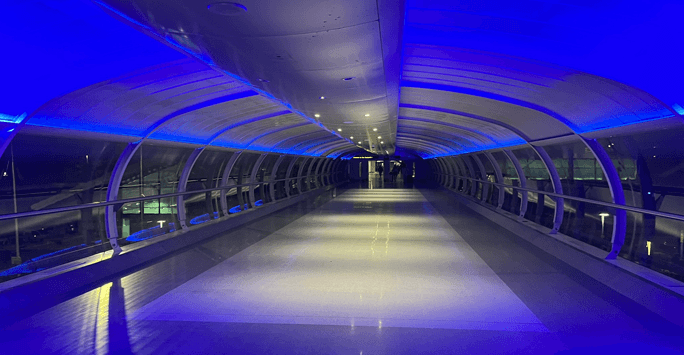“Nothing about us without us” - A reflection of ALT-Conference 2024
Posted on: 16 September 2024 by Rob Lindsay in Conference & Event Reports

From 3-5 September 2024, the Centre for Innovation in Education proudly participated in the ALT Conference as both attendees and contributors. Our team led a hands-on workshop on inclusive curriculum design, while engaging with peers on innovative approaches to education. Curious about what we learned and how it could shape the future of education? Read on to find out.
A powerful principle and my key takeaway from the 2024 ALT (Association of Learning Technologists) Conference. The saying, theme of the 2004 International Day of Persons with Disabilities, was delivered on day three during an excellent panel-led discussion, the defining session format of the week.
The final conference morning had started slowly enough - to be expected following an entertaining Wednesday evening award’s dinner and busy prior two days of activity. As delegates filtered into the Radisson Blu’s Manchester suite, tenderly clutching coffees and pastry pick-me-ups, a lulled mood very quickly turned attentive.
On stage, an empowering conversation concerning lived experience. Each panellist shared sharp perceptions of navigating inclusion and accessibility across education and industry. Lucy Woodcock (AbilityNet) reminded the audience of the key phrase to cement an already impactful session. “Nothing about us without us.” A direct line to the foundation of inclusivity: inclusion, representation, participation.
Equality, diversity and inclusion (EDI) makes simple sense when considered in these terms, yet despite growing awareness, the education sector still struggles to fully recognise that this approach must be integrated into all aspects of policy and pedagogy. Inclusion should not be an afterthought but a fundamental principle in the planning process. Over the past year, the Centre for Innovation in Education (CIE) have sought to uphold this principle, integrating student voices into our curriculum design process wherever possible. Hearing from the panel reinforced the importance of 'Nothing about us without’, and this session was a powerful reminder that positive change happens when those directly impacted are a part of the conversation.
The previous day’s student panel, imagining the future of education, had proven equally insightful. The confidence and awareness of the panellists shone through in a well-facilitated session and led to an engaging and honest conversation around the impact of technology, flexible pedagogy and preparation for an evolving digital workplace. The panel discussed the potential of AI, VR, and AR to transform learning by fostering personalisation and flexibility. While there was optimism, the panel also cautioned against an over-reliance on technology. It was clear: technology must be a tool for enhancing engagement and interaction, not a barrier. By listening to this insight, we can better understand how to integrate tech in ways that benefit students, academically and in their well-being.
And in the opening conference keynote, Chris Friend delivered a call to humane education, outlining the power of connection and empathy. Priority must be student agency and connection over technology-driven solutions. That this was delivered during a session with multiple technical issues only strengthened a core message, it is time to acknowledge a loss of presence in education. Chris also argued against a reliance on standardisation, “Design for choice, not standardisation… there is no standard student”. A key point, offer flexibility and reduce the technological barriers to engagement - echoed comprehensively across all three main sessions.
Beyond the keynotes, a range of workshops, presentations and breakout discussions contributed to a rewarding schedule. The “Doing, reflecting, improving, collaborating” theme enabled plenty of choice and diversity of topic. The Centre for Innovation in Education were represented by Laura Blundell and me, delivering a hands-on, reflective workshop on developing an inclusive curriculum. If you're looking to make your curriculum more inclusive, I recommend exploring the Inclusive Curriculum Development Tool. We’ve seen significant improvement in student engagement by adopting some of the practices outlined and we’re always excited to collaborate with colleagues who are passionate about fostering inclusive learning and teaching. Laura adds: “Opportunities like this are great for CIE. By facilitating discussions around shared good practice in our inclusive curriculum workshops, we get to explore the positive experiences of colleagues and students from across the sector. Often, we hear about innovative approaches to common challenges, which we then bring back to Liverpool.”
While the overall conference content was rich and thought-provoking, there were logistical aspects that could have aligned better with the values discussed. The choice of venue at Terminal 2, Manchester Airport, seemed at odds with the principle of inclusivity and considered learning spaces, which was a central theme throughout the event. At a time when Universities are facing financial challenge, opting to not give hosting rights to an educational institution denied a partner campus showcase and valuable revenue opportunity. That said, once the pre-airport terminal check-in was complete the overall in-person experience was good, and the conference facilities supported an engaging and immersive event.

Checking out? Exploring suitable learning spaces
As I made my way back through the eerie, quiet corners of Terminal 2 after hours, it offered an unexpected moment for reflection. Online still feels like a separate entity altogether at this event. The separation between online and in-person attendees was evident throughout the conference, with digital participation largely limited to Vevox-hosted questions or semi-structured activity on Discord. This felt like a missed opportunity to foster true collaboration across formats. Future ALT conferences could explore more interactive hybrid models, perhaps by integrating better online discussion spaces that facilitate more meaningful exchanges between virtual and in-person participants. In an era where online collaboration is essential, we need to rethink how virtual and in-person attendees can meaningfully interact. For an inclusive Association of Learning Technologists to practice what we preach, this must be addressed.

A reflective Terminal 2 walkway after hours
The ALT Conference 2024 highlighted both the opportunities and challenges of transforming education in an increasingly digital world. By embracing the principle of “Nothing about us without us,” we can continue to push for an inclusive, flexible, and engaging learning environment for all students. But as we move forward with hybrid, from workshops to lectures, it's crucial to model the inclusivity we aim to foster in our institutions. Let’s ensure that both virtual and in-person spaces are equally engaging, so that all perspectives are represented.
Keywords: Inclusivity, Events, Conferences, ALT, Online Learning, Hybrid, Reflection, EDI.